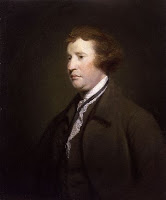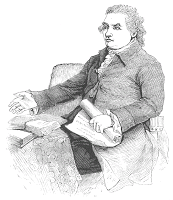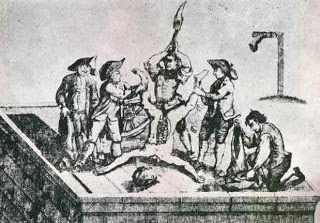 Edmund Burke: "Defeatist" regarding England's war with America.
Edmund Burke: "Defeatist" regarding England's war with America. Senator Harry Reid (D-Nevada) thought that the Republican Attack Apparat had grown a bit peckish in recent weeks, and so he decided to throw it a meat-laden bone on which it could feed for at least a week:
"I believe myself that the secretary of state, the secretary of defense — and you have to make your own decision as to what the president knows — that this war is lost, and that the surge is not accomplishing anything, as indicated by the extreme violence in Iraq yesterday."
The problem with Reid's assessment is not in its “defeatism,” but rather in its moral cowardice, a trait that runs through the Democrat leadership like a vein of fat in a well-marbled steak.
The war in Iraq “is lost” indeed, but not because of a tactical or strategic failure. America – the country, as distinct from the pack of criminals and degenerates we're told to call “our” government – lost that war the moment it began. And patriotism demands that the government lose that war as well.
Let me be unambiguously clear on this point: I want the federal government to lose the war in Iraq.
As a patriot I must oppose wars prosecuted in an unconstitutional fashion. As a Christian I am required to oppose aggressive wars of any kind (including those declared by Congress). As a father, I have no intention of letting the State steal the lives of any of my five children – or those of any other parent, if I have the ability to prevent it – and waste them in depraved ventures of this sort.
Unless the Regime is forced to concede defeat in Iraq, withdraw our troops, and punish the policymakers who led our nation into this abominable mess, we're in for a generation or more of similar undertakings across the globe -- assuming that our country doesn't descend into unalloyed despotism and economic ruin much sooner.
There was a time when conservatives fiercely and consistently opposed war, and did not flinch from urging the defeat of such iniquitous undertakings – as a patriotic imperative.
Two hundred and thirty years ago (April 3, 1777, to be precise), the estimable British statesman Edmund Burke wrote a letter to the sheriffs of Bristol, a city Burke represented in Parliament. The war against the upstart American colonies was in its second year, and Burke – who had vigorously opposed the war on solidly conservative grounds – was dismayed and disgusted to the depths of his soul.
“Indeed, our affairs are in a bad condition,” Burke lamented. “I do assure those gentlemen who have prayed for war, and obtained the blessing they have sought, that they are at this very instant in very great straits. The abused wealth of this country continues a little longer to feed its distemper.”
Like many genuine English patriots, Burke couldn't countenance the creation of a rented “coalition of the willing” -- “German allies of twenty hireling states” against the colonies, and he may have taken some ironic satisfaction in the fact that the Americans were holding firm.
“America is not subdued,” he wrote, as if addressing supporters of the war. “Not one unattacked village which was originally adverse throughout that vast continent has yet submitted from love or terror. You have the ground you encamp on, and you have no more. The cantonments of your troops and your dominions are exactly of the same extent. You spread devastation, but you do not enlarge the sphere of your authority.”
That passage aptly describes the condition of the forces sent by Washington to occupy Iraq, where even the vaunted Green Zone is no longer secure. The one that follows seems almost perfectly tailored to fit our present circumstances, in which a self-enraptured ruler and his courtiers – none of whom has known the terrors of combat – have bullied much of the public into supporting their disastrous crusade:
“I may be unable to lend a helping hand to those who direct the state; but I should be ashamed to make myself one of a noisy multitude to halloo and hearten them into doubtful and dangerous courses. A conscientious man would be cautious how he dealt in blood.”
“The poorest thing that crawls on earth, contending to save itself from injustice and oppression, is an object respectable in the eyes of God and man,” Burke continued. “But I cannot conceive any existence under heaven ... that is truly more odious and disgusting than an impotent, helpless creature, without civil wisdom or military skill, without a consciousness of any qualification for power but his servility to it, bloated with pride and arrogance, calling for battles he is not to fight, contending for a violent dominion he can never exercise, and satisfied to be himself to be himself mean and miserable....”
 "Impotent, helpless creature[s] ... bloated with pride and arrogance": Neo-con war boosters Johan Goldberg and Richard Perle (l.), and William Bennett (right, on the right).
"Impotent, helpless creature[s] ... bloated with pride and arrogance": Neo-con war boosters Johan Goldberg and Richard Perle (l.), and William Bennett (right, on the right).

The war in America was fought to prevent the dismemberment of the Empire, Burke observed, but it was imperiling the Anglo-Saxon system of liberty under law that made the Empire worth saving (in his view). He was particularly exercised about a measure proposed in February 1777 that would suspend the habeas corpus guarantee.
That bill, writes Stanley Weintraub in his fascinating study Iron Tears: America's Battle for Freedom, Britain's Quagmire, 1775-1783, was “aimed at stifling dissent in the colonies by revoking the right to habeas corpus, a safeguard to liberty cherished by Englishmen.... The bill was presented in the Commons on February 7, 1777, and to obfuscate its intentions it was formally titled as legislation `to empower his Majesty to secure and detain persons charged with, or suspected of, the crime of high treason committed in North America, or on the high seas, or the crime of piracy.”
Honest and well-informed people would recognize in that measure the ancestor of the Bush Regime's Military Commissions Act, which suspends habeas corpus protections of those accused of involvement in terrorism, and provides for their indefinite detention.
Burke understood that if this measure – which he couldn't defeat – went unchallenged, it would threaten the liberties not just of the American Colonists, but of all Englishmen everywhere:
“Liberty, if I understand it at all, is a general principle, and the clear right of the subjects within the realm, or of none. Partial freedom seems to me a most invidious mode of slavery. But, unfortunately, it is the kind of slavery the most easily admitted in times of civil discord: for parties are but too apt to forget their own future safety in their desire of sacrificing their enemies.”
The “partial” suspension of habeas corpus, Burke correctly insisted, was nothing of the kind; it established a principle “which may be advanced further and further at pleasure, on the same argument of mere expedience....”
Because of the war in America, Burke sorrowfully observed, “not only our policy is deranged, and our empire distracted, but our laws and our legislative spirit appear to have been totally perverted by it.”
For speaking and writing in defense of the rule of law and in opposition to the war, Burke wryly noted, “I am charged with being an American” -- the direct equivalent, in that time, of being accused of sympathizing with “Islamo-Fascists” today.
Burke wasn't an American, of course; he was a loyal and patriotic British subject who wanted his government to abandon its demented war for the good of everybody. And in this he was in good and plentiful company, as Weintraub's book documents: Most conservative figures in London, as well as some radicals, opposed the war with America, and were hardly diffident in expressing their views.
In 1764, during a parliamentary debate over taxing the colonies, Colonel Isaac Barre (a veteran of the French and Indian War) rose to rebuke those who insisted that the long-indulged American colonies needed to be reduced to servility.
“They [were] nourished up by your indulgence? They grew by your neglect of them,” insisted Barre. “As soon as you began to care about them, that care was exercised in sending persons to rule them in one department and another ... sent to spy out their liberties, to misrepresent their actions, and to prey upon them.”
Twelve years later, with blood on the ground and British troops in the field, Col. Barre proposed cutting off all funding for the war: He considered the “cut-and-run” option the only honorable and practical alternative. (Col. Barre also rose in Parliament to defend General Washington's reputation after he was attacked by the courtier press as a “dictator” for accepting extraordinary war powers from the Continental Congress.)
Dr. Richard Price, a parson-philosopher who was a close friend of Benjamin Franklin, argued in a pamphlet entitled An Essay on Civil Liberty and the Justice and Policy of the War with America that the war would be a financial, moral, and political disaster for England.
“Thereafter, whenever the Crown proclaimed a day of fasting and prayer to the Almighty for a blessing on their arms – a propaganda device often exploited to build popular support – Parson Price, from his pulpit, and to crowded congregations, outspokenly decried its mischief
and folly,” recounts Weintraub.
Heeeeeeeeeeere's Johnny Wilkes: The MP and radical Lord Mayor of London, as depicted by Hogarth.
Rather than being hauled to gaol as a traitor, or even widely reviled as a defeatist, Price was well-respected in London, whose mayor, the radical John Wilkes, made no secret of his opposition to the war. "We are fighting for the subjection, the unconditional submission of a country infinitely more extended than our own," Wilkes insisted. As a proud English patriot who championed “universal liberty and the rights of all mankind," Wilkes predicted that "no part of the subjects of this vast empire will ever submit to be slaves."
London attorney William Hickey organized a small group of prominent parliamentarians who condemned “the folly and injustice of the Government in endeavoring to dragoon the Americans into unconditional submission....” Hickey and his companions offered a daily toast, “Success to the Americans” -- and one of them even named his private cutter Congress.
Such supposed sedition was remarkably common in London. “Every night during the American war,” recalled parliamentarian Thomas Coke, “did I drink to the health of General Washington as the greatest man on earth.” Anti-war and anti-enlistment broadsides circulated widely throughout LondonAs I've noted elsewhere, David McCullough's book 1776 offers many examples of outspoken English opposition to the war with America. One London newspaper denounced the escalating British war against the rebellious colonies as "unnatural, unconstitutional, unnecessary, unjust, dangerous, hazardous, and unprofitable."
Another denounced the King, regarded by many as a dim-witted and shallow man (he wasn't), as "foolish, obstinate, and unrelenting" for his determination to take the country to war. Similar sentiments resounded during the legislative debate over King's October 1775 war speech. One critic described the King’s war plans as "big with the most portentous and ruinous consequences"; he was particularly opposed to sub-contracting troops from foreign powers, a move he called an "alarming and dangerous precedent."
These critics of King George's war in America, it should be remembered, lived under the shadow of the Treason Act of 1351, which dictated death by decapitation for nobles, and by torture – being drawn and quartered – for commoners convicted of the offense. At the very least, they faced the prospect of prolonged imprisonment under the anti-dissent law opposed by Burke.
Yet they spoke out against the American War with a vigor and candor not displayed by the likes of Harry Reid. Like the rest of what passes for leadership in his pusillanimous party, Reid is willing to criticize the Bush Regime's incompetence without telling the unvarnished truth about the war itself, to wit: It was an abomination from the beginning, and should be brought to an end immediately.Obviously, the war in Iraq is not a perefect parallel for our War for Independence. Those fighting against the U.S.-led occupation are not the heirs of Washington and Paul Revere. Bush's war is an act of cynical aggression clumsily disguised by the rhetoric of necessity, rather than an effort to reclaim rebellious colonies
In any case, it must be said that the War against the American Colonies waged by England's King George III, however monumentally unjust, was more defensible than the war in Iraq waged under America's King George II.
True patriots know when to root for their government's defeat. This is such a time.
Make sure to check out The Right Source.



7 comments:
Hate to say this, because too many folks are so soft in the head, but I've believed for the longest time that the only thing that'll bring the troops home would be a bloody defeat with many casualties. Something I fear that only the fool in chief would be brazen enough to initiate. Go ahead and poke Iran in the eye and watch our mid-east Fort Apaches burn to the ground. Thats what it will take to bring the seeds of arrogant hubris to fruition and our ultimate, and well deserved, destruction.
Let the internationalist oligarchy that runs this ruined state experience devastating defeat and utter failure in Iraq and in all the other 100+ countries where they have consigned their UN resolution enforcing Hessians. They use us as cannon fodder to fight and die in nations that haven't committed any acts of aggression against us, outsource our best jobs in the blue and white collar professions to India and China while encouraging US companies to move offshore, subsidize foreign competition at taxpayers' expense and leave our borders in a perpetual state of anarchy; and in return we grovel like lickspittle helots eager to pledge our support to the latest cable news hyped, ass clown apparatchik from the Demopublicratican/Recratopubican Party! Oh, look! There's Ichabod Crane Kerry and New Age Tofflerite Gingrich "debating" on CSpan. The Hegelian dialectic displayed in perfect form right on my own Orwellian home telescreen. Pass the popcorn, Osama!
Will, I'm almost certain that I probably go against your grain when I speak of “commoners,” or us essentially, our way of thinking and, by extension, how we walk (vote, live our life) instead of how we talk, being the real issue. One's actions speak louder than one's words, after all, in reflecting one's real character, integrity, and so forth.
Anyway, let me start by saying I agree with your entire premise here and Burke certainly qualifies as a patriot among historical figures of the founding era precisely because of the stalwart character he obviously displayed in public venues and by his actions, despite the risks. Ergo, your “Burkeisms,” as it were, quoted here in this context couldn’t be more apropos, IMO.
That said, I have one question that I think you, with your demonstrated high-caliber intellect can perhaps answer qualitatively for my uneducated mind. I didn’t graduate HS after all ;).
You said:
The one that follows seems almost perfectly tailored to fit our present circumstances, in which a self-enraptured ruler and his courtiers – none of whom has known the terrors of combat – have bullied much of the public into supporting their disastrous crusade...
I'm curious. Why do you say “bullied” in regard to the commoners vs. Leviathan in this particular context? Yes, the emphasis is there on purpose because, in general, yes, one could state that Leviathan is force and bullies its subjects, which would certainly be true, but nevertheless somewhat equivocal. However, in this particular context, I must say, the commoners haven’t been “bullied” in any way that I can see. If you're implying by saying “bullied” that the public was forced, coerced, or otherwise compelled in some fashion to support the Iraq War, how so?
I fully understand that to drill home a larger point concerning Leviathan one has to purposely and poignantly emphasize the inherent force and coercion traits of Leviathan, in general, über alles.
Nevertheless, in a formerly republican, now quasi-democratic system, that kind of carefully crafted prose also (inadvertently, I'm sure) negates in many minds, to a large degree, the public’s OWN role and responsibility in forging or shaping Leviathan’s policies and consequent actions, especially absent any real force (a gun to the head, for an albeit extreme example). Alas, are the people not able to discern the obvious and make up their OWN minds? After all, YOU weren’t fooled, Will, I certainly wasn’t fooled, and a host of others, as well, were not fooled, nevermind “bullied,” into supporting this imperial war. Many of us, of course, may not have known all the particulars as to why we didn’t support this war other than it was blatantly unconstitutional (the obvious) which, needless to say, was/is reason enough to oppose it, but we nevertheless saw it as wrong.
It's really this simple: if people can't discern the obvious, they certainly can't be expected to discern the obscure.
So aren’t you implying by logical extension, then, that the public at large is essentially, at the very least, culpable to some degree? Of course, it should be duly noted that public support has greatly wilted over the span of time, but naturally anybody anywhere with a picobrain eventually, after the painful consequences have long been felt, “gets it” when they finally SEE clearly the plane about to crash and burn. Ergo, that’s inconsequential to my point here.
And to clarify, I’m not saying by this that government doesn’t bully or coerce the public on many issues. They’re obviously bullied into paying taxes, among other things, but most of the wars/legislation/ordinances that government actuates are supported by the people collectively themselves. That happens either actively through the ballot box, vocally, or passively by being SILENT and apathetic. The majority’s silence and passivity “speaks” or “roars” louder oftentimes than a minority making some noise.
Will, I gather that you do not subscribe to the maxim that the people get the government they deserve? That statement does not in any way imply what they claim they may want (how they’re talking), but what they actually deserve (how they’re walking).
As I've mentioned before, I really think you're prone to excuse the populace of its own dirty hands in the form of government it "enjoys" (or loathes).
"War is an ugly thing but not the ugliest of things; the decayed and degraded
state of moral and patriotic feelings which thinks that nothing is worth war
is much worse. A man who has nothing for which he is willing to fight,
nothing which is more important than his own personal safety, is a miserable
creature and has no chance of being free unless made and kept so by the
exertions of better men than himself."
~John Stuart Mill
Though I'm not unduly deferential to John Stuart Mill's perspective (since I'm not a utilitarian), I certainly agree with the statement quoted above.
I will point out that people willing to hire out as armed enforcers for the degenerate regime that rules us aren't necessarily "better" men, any more than were the Hessians who did George III's bidding. Those within the military who enlisted to serve our country, rather than the regime, are even more disgusted by the depraved Iraq war than I am.
As to those things for which I am ready and prepared to fight, see the following entries:
http://freedominourtime.blogspot.com/
2006/08/these-are-my-sons_25.html
http://freedominourtime.blogspot.com/
2006/09/how-to-handle-draft-nappers-fantasia_
07.html
http://freedominourtime.blogspot.com/
2007/04/second-amendment-constitution-in.html
Another Burke quote, courtesy of George McGovern:
A conscientious man would be cautious how he dealt in blood.
BEYOND ARROGANCE
It was well-known that Pakistan´s
Dictatorship might fall,
Yet repercussion in Japan´s
Flared unequivocal.
´Tis not wise to impose, impinge
On friendship overmuch;
As now friends of this land must cringe
Because the bully´s touch.
More than mere arrogance--if there
Had been some principle
Behind it one may be cocksure--
But it bodes never well
To pressure friends, for one´s own greed
To give up lots of stuff,
Concede, concede, and more concede,
Because one treats them rough.
Post a Comment